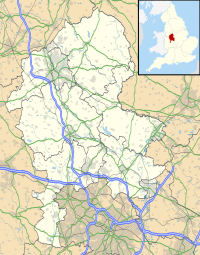St Andrew's Church, Weston-under-Lizard
| Church of St Andrew, Weston-under-Lizard | |
|---|---|
 | |
 Church of St Andrew, Weston-under-Lizard Location in Staffordshire | |
| Coordinates: 52°41′36″N 2°17′18″W / 52.6932°N 2.2883°W | |
| Location | Weston-under-Lizard, Staffordshire |
| Country | England |
| Denomination | Church of England |
| History | |
| Dedication | Saint Andrew |
| Architecture | |
| Heritage designation | Grade I |
| Designated | 19 March 1962 |
| Architect(s) | Elizabeth Wilbraham, George Edmund Street, Ewan Christian |
| Completed | Medieval, with 18th and 19th century restorations |
| Administration | |
| Deanery | Penkridge |
| Diocese | Diocese of Lichfield |
| Clergy | |
| Priest(s) | The Revd Rachel Elizabeth Dale |
The Church of St Andrew, Weston-under-Lizard, Staffordshire is a Grade I listed Anglican church. Its origins are medieval, but it was largely rebuilt in the very early 18th century by Elizabeth Wilbraham of Weston Park, and restored in the 19th century, firstly by George Edmund Street and then by Ewan Christian. It remains a functioning parish church in the Diocese of Lichfield.
History[]
Historic England records the foundation of the church as medieval.[1] Pevsner describes the church as "an enterprise of Lady Wilbraham...[of] 1700–1".[2] This was Elizabeth Mytton, heiress of the Weston estate, who married Sir Thomas Wilbraham in 1651. A 2010 article in the Architects' Journal by the historian John Millar, describes Elizabeth Wilbraham as "the first woman architect", and suggests that she may have undertaken designs for over 350 buildings, as well as tutoring and collaborating with Christopher Wren.[3] Prevented by the conventions of the time for identifying as an architect, and from taking any public role in construction, Millar suggests that buildings attributed to architects such as Hugh May, Roger Pratt and William Winde, were in fact designed by Wilbraham, with the named architects acting as surveyors to carry out her plans.[4] Millar's views are not universally accepted, and his planned book on Wilbraham has yet to be published.[5] It is generally accepted that Wilbraham undertook designs for a number of buildings for family and friends, including her own home, Weston Park, and the estate Church of St Andrew.[a][2]
St Andrew's continues as a functioning church in the Diocese of Lichfield.[7]
Architecture and description[]
Pevsner records that "only the east wall with a 14th century window" remained of the medieval church when Elizabeth Wilbraham begun her reconstruction in 1700.[2] The tower and nave are her work. The tower is of five stages, with a castellated final stage. Historic England describes the nave as "provincial Baroque".[1] George Edmund Street undertook a restoration in around 1869,[1] and the font is his. Further work, including the construction of a family chapel, was done by Ewan Christian in 1876–1877. The chapel, and the church, contain monuments to the Earls of Bradford and their families,[2] who owned Weston Park until 1986.[6]
Footnotes[]
References[]
- ^ a b c Historic England. "Church of St Andrew, Weston Park (Grade I) (1294950)". National Heritage List for England. Retrieved 22 May 2020.
- ^ a b c d Pevsner 1974, pp. 306–307.
- ^ Merrick, Jay (February 16, 2011). "Elizabeth Wilbraham, the first lady of architecture". The Independent. Retrieved 23 May 2020.
- ^ Millar, John (11 November 2010). "The first woman architect". Architects Journal. Retrieved 23 May 2020.
- ^ Kahn, Eve M. (March 8, 2012). "Maybe a Lady Taught Christopher Wren". The New York Times. Retrieved 23 May 2020.
- ^ a b "The History of Weston Park". Weston Park. Retrieved 23 May 2020.
- ^ "Weston-under-Lizard, St Andrew's". www.achurchnearyou.com. Church of England. Retrieved 23 May 2020.
Sources[]
- Pevsner, Nikolaus (1974). Staffordshire. Buildings of England. London, UK: Penguin Books. ISBN 0-14-071046-9.
See also[]
- Church of England church buildings in Staffordshire
- Grade I listed churches in Staffordshire
- Diocese of Lichfield
